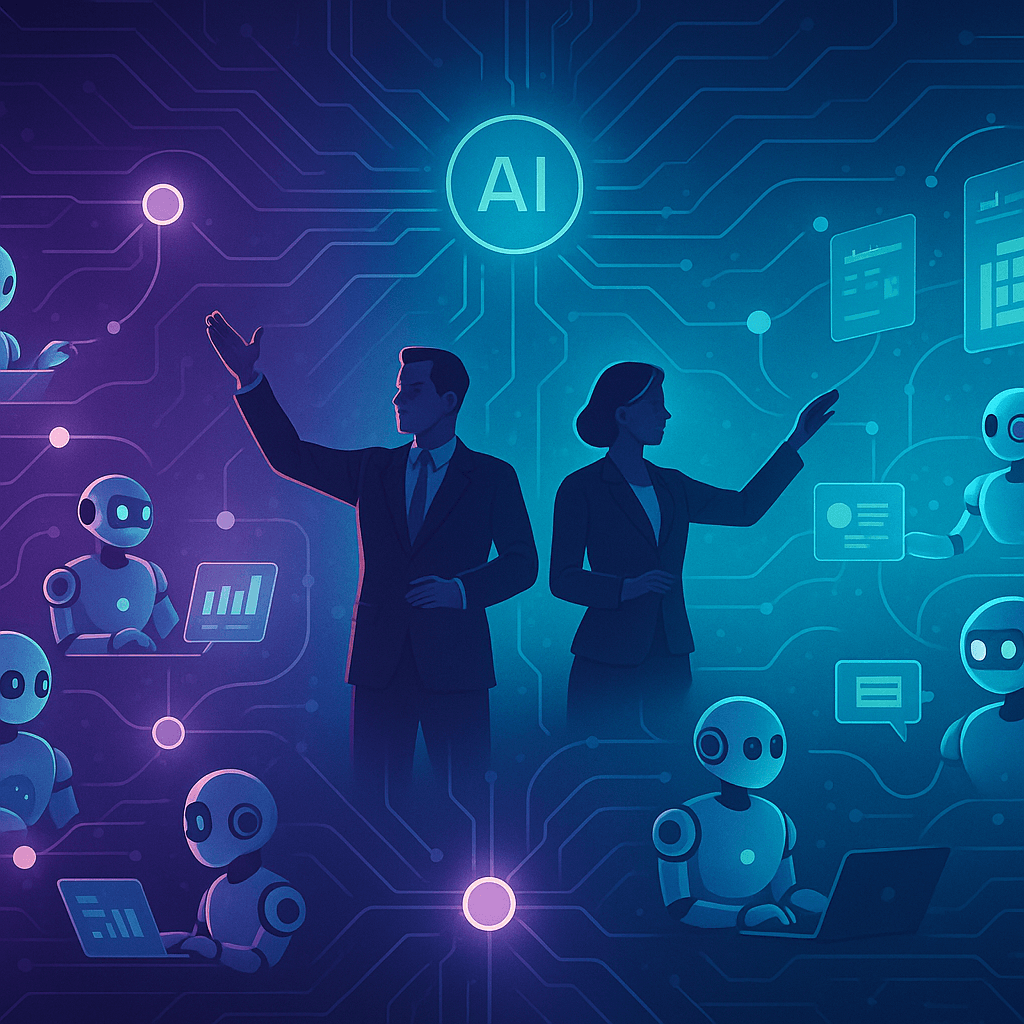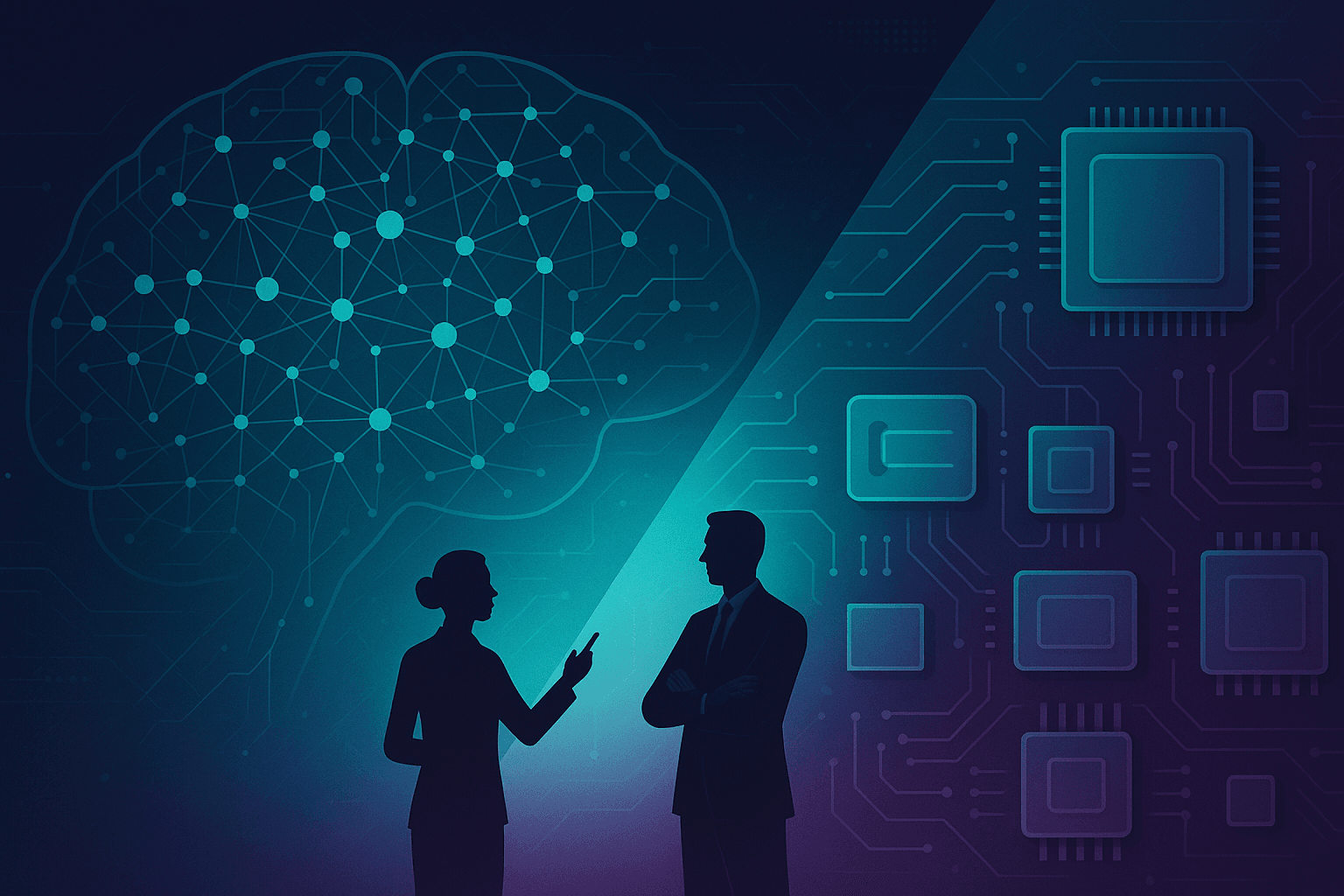The rise of agentic solutions
How multi-agent systems will increase productivity, creativity and transform industries — and what this means for your career.

AI agents, powered by Large Language Models (LLM), are already transforming industries by offering greater flexibility and intelligence compared to traditional software. But the real power of these agents is unleashed when they are brought together in multi-agent systems to collaborate, learn, adapt and even compete to solve complex problems and drive continuous reinvention.
At 6 AM, Sarah’s AI assistant had already coordinated with three other agents to restructure her entire workday. The supply chain agent detected a critical shipment delay that would impact her afternoon client presentation. The scheduling agent immediately rearranged her calendar, moving the presentation to Thursday and blocking time for contingency planning. Meanwhile, the research agent began compiling alternative supplier data and risk mitigation strategies. By the time Sarah checked her phone, she had a restructured day, a backup plan, and three strategic options waiting for her approval.
Sarah isn’t a CEO or a tech executive. She’s a mid-level operations manager — and this is her Tuesday. Sarah’s experience illustrates what happens when generative AI agents, powered by Large Language Models, move beyond individual tasks to collaborate in multi-agent systems. Unlike the frustrating chatbots of the past — remember trying to book travel and hitting a wall when you wanted to “add our daughter and husband just for the hotel accommodation”? — these new systems can collaborate, learn, adapt and even compete to solve complex problems and drive continuous reinvention.
The shift from single agents to agentic solutions represents a fundamental transformation in both technology and human work. Traditional digital agents relied on hard-coded instructions that made them ineffective when tasks or conditions changed. But generative AI agents can learn from context, adapt to dynamic situations, and handle scenarios that traditional systems could not.
When you put multiple agents together — coordinating, competing, and collaborating — you get something unprecedented: AI systems that don’t just automate processes, but continuously reinvent them. Sarah’s supply chain agent didn’t just detect a delay; it learned from the disruption pattern and proactively suggested process improvements for future scenarios. This continuous reinvention capability means that both the technology and the humans working alongside it must constantly evolve.
This creates an entirely new category of professional skill: the ability to orchestrate intelligent systems that themselves are learning and adapting. Unlike previous automation waves that replaced human tasks, agentic systems create new forms of human-AI collaboration that require strategic thinking, contextual judgment, and the ability to guide autonomous systems toward business outcomes.
The professionals who succeed won’t be those who fear AI displacement — they’ll be those who master AI orchestration. Research shows that one-third of companies have already started deploying AI agents, and within two years, three-fourths of knowledge workers will use AI agents daily. By 2028, we expect to see the first truly autonomous manufacturing plants. The question isn’t whether agentic systems will impact your career — it’s whether you’ll be ready to thrive alongside them.
This isn’t just another technological upgrade — it’s the most significant shift in workplace dynamics since the rise of the knowledge economy. And unlike previous waves, it’s happening across every industry simultaneously.
TL;DR
- Multi-agent systems orchestrate entire workflows — not just automating tasks, but continuously learning and reinventing processes — Career evolution: The shift from task management to intelligent orchestration becomes the core professional skill.
- 82% of companies plan to integrate AI agents within 3 years — yet most professionals lack orchestration skills to guide these systems — Timeline urgency: The window to develop agentic collaboration capabilities is narrowing rapidly.
- Marketing teams report significant performance improvements — but only when professionals master agent collaboration, not just tool usage — Competitive advantage: Early adopters who understand human-AI orchestration are setting new performance standards.
- New high-value roles emerging: Agent Prompt Engineers earn 40–60% more than traditional specialists because they multiply campaign effectiveness across entire organisations — Career opportunity: AI orchestration skills command significant salary premiums and organisational influence.
- The biggest barriers aren’t technical — they’re human: Skills gaps, cultural resistance, and leadership readiness determine success or failure — Strategic positioning: Professionals who can bridge the workforce readiness gap become indispensable strategic assets.
- Manufacturing plants will be fully autonomous by 2028 — but humans who master “AI orchestration” will define how these systems operate — Future readiness: The question isn’t whether AI will impact your career, it’s whether you’ll lead the transformation or be transformed by it.
Understanding agentic architecture: From automation to orchestration
What exactly is an AI agent?
An AI agent is a software program designed to perform intricate tasks autonomously. Unlike traditional digital agents that relied on rigid, hard-coded instructions, generative AI agents powered by Large Language Models can learn from context and adapt to dynamic situations. They can adjust travel plans after flight cancellations, negotiate contract terms, or — as in Sarah’s case — coordinate complex operational responses across multiple business functions.
But here’s where the transformation becomes profound: putting multiple generative AI agents together to collaborate, coordinate, and compete marks a paradigm shift in how both companies and careers operate. These multi-agent systems don’t just enhance automation — they create dynamic, intelligent networks that drive smarter, faster decision-making than any traditional system could match.
The result? A fundamental redefinition of human value in the workplace.
The Architecture of Intelligence
Agentic architecture — the technical framework that allows “teams” of agents to make autonomous decisions in complex environments — represents more than a technological upgrade. It moves AI agents from the passive role of “informing” to the active role of “implementing,” enabling them to manage complex workflows with minimal human oversight.
Consider how this plays out in practice:
Manufacturing: Quality control agents detect defects while scheduling agents automatically adjust production timelines and procurement agents source alternative materials — all coordinating in real-time without human intervention.
Finance: Risk assessment agents identify market anomalies while trading agents adjust portfolios and compliance agents ensure regulatory adherence — creating a self-managing financial ecosystem.
Healthcare: Diagnostic agents analyse patient data while scheduling agents coordinate specialist appointments and treatment agents monitor medication interactions — delivering comprehensive care coordination.
But here’s the crucial insight most professionals are missing: these systems don’t eliminate human work — they elevate it.
The learning advantage: Why these systems keep getting smarter
One of the most powerful capabilities of modern AI agents is their ability to learn from mistakes through reflective capabilities and memory. When complemented by Reinforcement Learning from Human Feedback (RLHF), problems are identified and corrected as they arise. This means that both the agents and the humans working alongside them must continuously evolve their capabilities.
This creates an entirely new professional imperative: the ability to guide, teach, and collaborate with systems that are themselves learning and improving.
Sarah doesn’t just use her multi-agent system — she trains it. When the supply chain agent suggested a supplier that turned out to be unreliable, Sarah provided feedback that improved future recommendations not just for her, but for her entire organisation. This human-in-the-loop learning represents a fundamental shift from using tools to developing intelligent partners.
The scale of transformation
The numbers tell the story of how quickly this is happening:
- Today: One-third of companies use some form of AI agents (though many are still basic chatbots)
- 2026: Three-fourths of knowledge workers will use AI agents daily
- 2028: The first fully autonomous manufacturing plants will operate with minimal human oversight
For professionals, this timeline represents both urgency and opportunity. The window to develop agentic collaboration skills is narrowing, but those who master these capabilities now will define the next generation of workplace leadership.
Agentic systems in action: The marketing revolution
At 9 AM Monday, Emma’s marketing team launched a campaign. By 9 AM Tuesday, that campaign had been optimised 847 times, tested across 23 demographic segments, and automatically scaled to 12 new markets — all without a single human intervention.
This isn’t marketing automation as we’ve known it. This is marketing orchestration — and it’s redefining what it means to be a marketing professional in 2025.
From campaign management to agent orchestration
Traditional marketing automation handled sequential tasks: send email, wait for response, trigger follow-up. But agentic marketing systems coordinate multiple intelligent agents working simultaneously across the entire customer journey.
The Content Agent analyses trending topics, brand voice guidelines, and audience sentiment to generate dozens of creative variations in real-time. The Targeting Agent continuously refines audience segments based on engagement patterns and lookalike modelling. The Performance Agent monitors campaign metrics across all channels, automatically adjusting budgets and creative elements. The Personalisation Agent crafts individualised customer experiences based on real-time behavioural data and predictive modelling.
The result? Marketing campaigns that evolve faster than any human team could manage — and marketing professionals who need entirely new skill sets to guide these intelligent systems.
The new marketing career landscape
Emma isn’t managing campaigns anymore — she’s conducting an orchestra of AI agents. Her role has evolved from executing marketing tactics to strategically directing autonomous systems that handle execution at superhuman speed and scale. This transformation is creating entirely new career pathways:
1) Agent Prompt Engineers design the instructions and parameters that guide marketing AI agents, combining technical precision with creative strategy. These professionals earn 40–60% more than traditional marketing specialists because they can multiply campaign effectiveness across entire organisations.
2) Multi-Agent Campaign Orchestrators coordinate complex agent networks, understanding how different AI systems can collaborate to create seamless customer experiences. They’re becoming the strategic backbone of marketing organisations that deploy agentic systems.
3) Human-AI Experience Designers focus on the intersection points where human creativity and AI efficiency must work together, ensuring that automated systems maintain authentic brand voice and emotional resonance.
4) Marketing AI Ethicists ensure that autonomous marketing systems respect customer privacy, avoid bias, and maintain brand integrity — a role that’s becoming essential as agents gain more decision-making autonomy.
Skills that matter in the agentic era
Technical Fluency Without Technical Expertise: Marketing professionals don’t need to code AI agents, but they need to understand prompt engineering, performance optimisation, and system integration. Emma learned to “speak” to her agents through carefully crafted instructions that balance creativity with measurable outcomes.
Strategic Systems Thinking: Instead of managing individual campaigns, agentic marketers orchestrate interconnected systems. They need to understand how agent decisions in one area (like content generation) impact agent performance in another (like audience targeting).
Real-Time Decision Architecture: When AI agents can optimise campaigns 847 times in 24 hours, marketing professionals must learn to design decision frameworks that guide autonomous optimisation without requiring constant human approval.
Human-AI Collaboration Mastery: The most successful marketing professionals are those who know when to let agents operate autonomously and when human judgment is irreplaceable — like maintaining brand authenticity during crisis communications or navigating sensitive cultural contexts.
The competitive advantage of early adoption
Marketing teams that master agentic systems aren’t just getting better results — they’re operating in an entirely different paradigm. While traditional teams manage campaigns, agentic teams orchestrate continuous optimisation engines that learn and improve 24/7.
The numbers are compelling: Early adopters report significant improvements in campaign performance, 70% reductions in time-to-market for new initiatives, and the ability to personalise customer experiences at scales previously impossible for human teams.
But here’s the crucial insight: These improvements aren’t coming from the technology alone — they’re coming from marketing professionals who’ve developed the skills to effectively collaborate with and direct intelligent systems.
What this means for your marketing career
For professionals: The question isn’t whether agentic systems will impact your role — it’s whether you’ll be ready to orchestrate them or be orchestrated by competitors who can. The marketing professionals advancing fastest are those investing in AI collaboration skills now, before these capabilities become baseline expectations.
For businesses: Your talent strategy is your agentic strategy. Companies that successfully deploy marketing AI won’t just need new technology — they’ll need reimagined roles, upskilled teams, and entirely new performance frameworks. The winners will be those who can identify, develop, and deploy marketing talent that can effectively direct autonomous systems.
The marketing revolution is accelerating rapidly — and the professionals who shape it will be those who master the art of intelligent orchestration.
Ready to develop these orchestration skills? The window for competitive advantage is narrowing, but those who act now will define the next generation of marketing leadership.
Barriers to adoption: The human challenge behind the technology
As organisations rush to embrace agentic systems, the biggest barriers aren’t technical — they’re human. While the technology exists to transform how work gets done, most organisations lack the workforce capabilities needed to effectively orchestrate intelligent systems. Understanding and addressing these barriers determines whether agentic adoption creates competitive advantage or organisational chaos.
The skills gap crisis: Most professionals aren’t ready for AI orchestration
The barrier: Emma’s marketing team couldn’t deploy their agentic systems for six months — not because of technology limitations, but because no one knew how to effectively prompt, guide, and collaborate with AI agents. Traditional marketing skills didn’t translate to agent orchestration, and the learning curve was steeper than expected.
Why this matters: Organisations are discovering that deploying agentic systems requires an entirely new category of professional competencies. Prompt engineering, agent performance optimisation, and human-AI collaboration aren’t intuitive skills — they require dedicated development and practice.
Mitigation: Organisations must invest in comprehensive AI literacy programs that go beyond basic training to develop practical orchestration skills. This includes hands-on experience with agent management, cross-functional collaboration between human and AI teams, and continuous learning frameworks that evolve with rapidly advancing AI capabilities. The most successful companies are those building internal “AI orchestration academies” that help employees develop these critical skills systematically.
Cultural resistance: Fear of displacement vs. fear of being left behind
The barrier: While some employees resist agentic systems as threats to job security, others fear being left behind if they can’t master AI collaboration. This creates a complex cultural dynamic where both AI adoption and AI avoidance can trigger professional anxiety.
Why this matters: Unlike previous technology waves that primarily affected specific roles, agentic systems are transforming work across all functions simultaneously. This creates unprecedented organizational stress as entire teams must evolve their capabilities or risk obsolescence.
Mitigation: Successful organisations focus on “augmentation narratives” that clearly demonstrate how agentic systems elevate human work rather than replace it. This requires transparency about role evolution, clear career progression pathways for AI-augmented roles, and employee involvement in agentic system design. Regular feedback loops ensure that human-AI collaboration enhances rather than threatens job satisfaction and professional growth.
Leadership readiness: Executives who don’t understand AI collaboration
The barrier: Many senior leaders expect agentic systems to work like traditional software — deploy and operate with minimal ongoing management. They underestimate the strategic thinking required to effectively orchestrate intelligent systems and the organisational changes needed to support human-AI collaboration.
Why this matters: Agentic systems require continuous strategic guidance, performance optimisation, and ethical oversight. Organisations with leaders who don’t understand these requirements often deploy systems that underperform or create unintended consequences.
Mitigation: Executive teams need dedicated AI leadership development that focuses on strategic orchestration rather than technical implementation. This includes understanding how to evaluate AI performance, make human-in-the-loop decisions, and create organisational cultures that support effective human-AI collaboration.
Technical barriers: When smart systems meet organisational reality
Reliability and Performance Drift: Agentic systems rely on sequences of LLM outputs, which can introduce cascading risks. An agent might book flights to non-existent destinations, make biased decisions that result in litigation, or commit costly mistakes that compound across the system.
Mitigation: Implement robust accountability frameworks with clear human-agent responsibility definitions, explainable AI outputs, and consistent oversight mechanisms that ensure system reliability without stifling autonomous operation.
Legacy Process Inflexibility: Outdated, manual processes designed for human workflows limit agentic effectiveness. Manual approvals, human verification requirements, and rigid workflow structures prevent agents from operating autonomously.
Mitigation: Conduct comprehensive process audits to identify and eliminate redundant steps. Prioritise customer value over internal convenience, and design flexible workflows that accommodate both human and AI decision-making.
Data Quality Challenges: The “garbage in, garbage out” principle applies critically to agentic systems. Most organisations aren’t data-ready for intelligent agents that require high-quality, well-structured information to operate effectively.
Mitigation: Establish robust data governance frameworks, invest in data quality improvement, and create systematic approaches to data extraction, curation, and maintenance that support agentic operations.
Infrastructure Limitations: Multi-agent systems demand computing resources and technical architecture that many organizations haven’t developed. Legacy infrastructure can’t support the real-time coordination required for effective agentic operations.
Mitigation: Accelerate strategic IT investments, proactively address technical debt, and design digital infrastructure specifically tailored to support multi-agent coordination and collaboration.
The competitive imperative: Why addressing these barriers can’t wait
Organisations that successfully navigate these barriers will gain substantial competitive advantages: significant improvements in operational efficiency, 70% reductions in time-to-market, and the ability to operate at scales impossible for traditional teams.
But the window is narrowing. Companies that address workforce readiness barriers now will set the competitive standards for the next decade. Those that wait will find themselves benchmarking against competitors who’ve already mastered human-AI collaboration.
The question isn’t whether your organisation will face these barriers — it’s whether you’ll overcome them faster than your competition.
The agentic advantage: Your career strategy for the intelligent age
AI agents aren't a distant future - they're reshaping careers and industries right now. From Sarah's transformed operations role to Emma's evolution into an AI orchestrator, professionals across every function are discovering that agentic systems fundamentally redefine what makes someone valuable in the modern workplace.
The window is now. The talent, the models, and the capital are already in motion. Companies deploying agentic systems today are achieving significant performance improvements while creating entirely new categories of high-value work. But these gains aren't automatic - they require professionals who can effectively orchestrate intelligent systems.
For professionals: The window for developing AI orchestration skills is narrowing rapidly. While others debate whether AI will impact their roles, early adopters are mastering the collaboration capabilities that will define professional success in the intelligent age.
For businesses: Your agentic strategy is your talent strategy. The competitive advantage belongs to companies that solve the workforce readiness challenge first - building human capabilities needed to effectively orchestrate agentic systems at scale.
This is where Ascend comes in. We understand that mastering the agentic transformation isn't just about understanding AI - it's about orchestrating human potential alongside intelligent systems. Our AI-powered career platform helps professionals develop the orchestration skills that make you indispensable while enabling organisations to build the agentic-ready workforce that defines competitive advantage.
The agentic era has begun. Will you lead it?
Ready to master AI orchestration and unlock your potential in the intelligent age? Ascend can help you navigate the complexity and accelerate your next career move.
Sign up for early access 👉 www.ascendplatform.net


